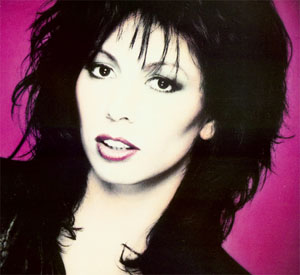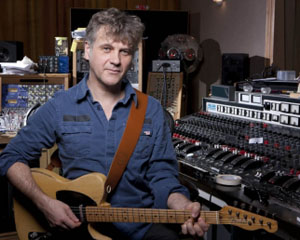Secrets of the Pop Song, BBC Two | reviews, news & interviews
Secrets of the Pop Song, BBC Two
Secrets of the Pop Song, BBC Two
How to write a ballad, with Rufus Wainwright and Guy Chambers
This hugely entertaining first instalment of a three-part investigation into what makes pop songs tick took as its theme "The Ballad", perhaps the most bomb-proof of pop's traditional forms. Mind you, the programme's definition of a ballad was pretty loose. For instance, I would say Sting's "Every Breath You Take" is merely medium-paced rather than a ballad. I'd just file Culture Club's "Do You Really Want to Hurt Me" under "Pop Song".
No arguments about "Candle in the Wind" or "Everybody Hurts" though, while Jennifer Rush's "The Power of Love" is the epitome of the so-called "Power Ballad", a lung-bursting sub-genre celebrated by the nerdish enthusiasts of Ultimate Power, who host events where they only ever play stuff like "Purple Rain" and Foreigner's "I Want to Know What Love Is". Meanwhile, the programme's central questions were how do you write songs like this? And could the hitherto untested partnership of Guy Chambers (tunesmith to the gentry) and the ravishing Rufus Wainwright concoct a convincing ballad in a mere two days?
Rufus himself harboured doubts. He'd tried co-writing before, he admitted languidly, and compared it to "a dentistry experience". Chambers also evinced mild anxiety, though his vast experience with Kylie, James Blunt and above all Robbie Williams must surely have imbued him with some measure of confidence.
In the event it all went astonishingly smoothly. Wainwright arrived at Chambers's London studio with a few musical jottings artlessy recorded on his Blackberry, including an attempt at rap ("I didn't encourage that," said Chambers cautiously). However, once these had been tactfully brushed aside, Chambers bashed out three musical possibilities on the piano, and Rufus found himself enamoured of the second one. He also took an instant liking to Chambers's suggestion of writing a song about World War Three (inspired by a then news-worthy military clash between North and South Korea). Soon, he was improvising a melody around the couplet: "World War Three between you and me". (Jennifer Rush, power-balladrix, pictured below.)
 Their progress was interspersed with soundbites and asides from other grand eminences of pop. Neil Tennant of the Pet Shop Boys gave us a glimpse into the workings of his song "Rent", with its acidic payoff, "I love you, you pay my rent". Sting was remarkably candid about "Every Breath You Take". "It's not in the least bit original," he admitted, saying that he'd pinched the idea for the tune from "Stand By Me" while the lyrics - "make", "take", "fake" - could have been culled from a rhyming dictionary. Still, he could afford a bit of self-deprecation, since this song alone continues to earn him royalties of oligarchic proportions.
Their progress was interspersed with soundbites and asides from other grand eminences of pop. Neil Tennant of the Pet Shop Boys gave us a glimpse into the workings of his song "Rent", with its acidic payoff, "I love you, you pay my rent". Sting was remarkably candid about "Every Breath You Take". "It's not in the least bit original," he admitted, saying that he'd pinched the idea for the tune from "Stand By Me" while the lyrics - "make", "take", "fake" - could have been culled from a rhyming dictionary. Still, he could afford a bit of self-deprecation, since this song alone continues to earn him royalties of oligarchic proportions.
Sting's true confessions also undercut the notion advanced by Boy George that songwriting must be intensely personal if it's to be successful, which surely couldn't be true of countless professional songwriters down the decades who churned out songs - many of which became classics - to order. The progress of the Wainwright-Chambers partnership likewise proceeded more through fortuitous coincidence and old-fashioned craft than any visionary outpourings of emotion. When Rufus suggested that they should bung in another verse before they went to the chorus, Chambers vetoed the idea. "Don't bore us, get to the chorus," he said, quoting a favourite old proverb among songwriters. Rufus found the saying so delightful that he promptly built it into his lyrics, where it remained despite Chambers's subsequent misgivings that it sounded too gimmicky and in-jokey (Guy Chambers, pictured below).
 He needn't have worried. Another lesson we learned was that while your basic song must have intrinsic strengths, it can nonetheless be utterly transformed by the production and the arrangement. Once Wainwright had added a spectacular lattice-work of vocal harmonies and tacked on an outrageously unsubtle extract from Tchaikovsky's 1812 Overture, "World War Three" suddenly became the epitome of melodramatic mega-balladry.
He needn't have worried. Another lesson we learned was that while your basic song must have intrinsic strengths, it can nonetheless be utterly transformed by the production and the arrangement. Once Wainwright had added a spectacular lattice-work of vocal harmonies and tacked on an outrageously unsubtle extract from Tchaikovsky's 1812 Overture, "World War Three" suddenly became the epitome of melodramatic mega-balladry.
All it needed now was some third party approval. When Chambers played the finished article to his old buddy and lyricist Don Black ("Born Free", "Diamonds are Forever" etc), Black enthused about the song and about Wainwright's theatrical performance of it. Then we saw a couple of professional radio pluggers having their first listen to the piece, and reacting with apparently spontaneous ecstasy. It would undoubtedly be a Radio 2 Record of the Week and be huge on commercial radio, declared Plugger One. Plugger Two envisioned the song as the climax to a Richard Curtis movie, or being played when an athlete won an Olympic gold medal. "It's completely anthemic!" he raved.
There we are then. Nothing to it. Anyone could do it. I'm just tuning up my guitar right now.
 Find Rufus Wainwright on Amazon
Find Rufus Wainwright on Amazon- Watch Secrets of the Pop Song on BBC iPlayer
Share this article
Add comment
more TV
 Blue Lights Series 2, BBC One review - still our best cop show despite a slacker structure
The engaging Belfast cops are less tightly focused this time around
Blue Lights Series 2, BBC One review - still our best cop show despite a slacker structure
The engaging Belfast cops are less tightly focused this time around
 Baby Reindeer, Netflix review - a misery memoir disturbingly presented
Richard Gadd's double traumas are a difficult watch but ultimately inspiring
Baby Reindeer, Netflix review - a misery memoir disturbingly presented
Richard Gadd's double traumas are a difficult watch but ultimately inspiring
 Anthracite, Netflix review - murderous mysteries in the French Alps
Who can unravel the ghastly secrets of the town of Lévionna?
Anthracite, Netflix review - murderous mysteries in the French Alps
Who can unravel the ghastly secrets of the town of Lévionna?
 Ripley, Netflix review - Highsmith's horribly fascinating sociopath adrift in a sea of noir
Its black and white cinematography is striking, but eventually wearying
Ripley, Netflix review - Highsmith's horribly fascinating sociopath adrift in a sea of noir
Its black and white cinematography is striking, but eventually wearying
 Scoop, Netflix review - revisiting a Right Royal nightmare
Gripping dramatisation of Newsnight's fateful Prince Andrew interview
Scoop, Netflix review - revisiting a Right Royal nightmare
Gripping dramatisation of Newsnight's fateful Prince Andrew interview
 RuPaul’s Drag Race UK vs the World Season 2, BBC Three review - fun, friendship and big talents
Worthy and lovable winners (no spoilers) as the best stay the course
RuPaul’s Drag Race UK vs the World Season 2, BBC Three review - fun, friendship and big talents
Worthy and lovable winners (no spoilers) as the best stay the course
 This Town, BBC One review - lurid melodrama in Eighties Brummieland
Steven Knight revisits his Midlands roots, with implausible consequences
This Town, BBC One review - lurid melodrama in Eighties Brummieland
Steven Knight revisits his Midlands roots, with implausible consequences
 Passenger, ITV review - who are they trying to kid?
Andrew Buchan's screenwriting debut leads us nowhere
Passenger, ITV review - who are they trying to kid?
Andrew Buchan's screenwriting debut leads us nowhere
 3 Body Problem, Netflix review - life, the universe and everything (and a bit more)
Mind-blowing adaptation of Liu Cixin's novel from the makers of 'Game of Thrones'
3 Body Problem, Netflix review - life, the universe and everything (and a bit more)
Mind-blowing adaptation of Liu Cixin's novel from the makers of 'Game of Thrones'
 Manhunt, Apple TV+ review - all the President's men
Tobias Menzies and Anthony Boyle go head to head in historical crime drama
Manhunt, Apple TV+ review - all the President's men
Tobias Menzies and Anthony Boyle go head to head in historical crime drama
 The Gentlemen, Netflix review - Guy Ritchie's further adventures in Geezerworld
Riotous assembly of toffs, gangsters, travellers, rogues and misfits
The Gentlemen, Netflix review - Guy Ritchie's further adventures in Geezerworld
Riotous assembly of toffs, gangsters, travellers, rogues and misfits
 Oscars 2024: politics aplenty but few surprises as 'Oppenheimer' dominates
Christopher Nolan biopic wins big in a ceremony defined by a pink-clad Ryan Gosling and Donald Trump seeing red
Oscars 2024: politics aplenty but few surprises as 'Oppenheimer' dominates
Christopher Nolan biopic wins big in a ceremony defined by a pink-clad Ryan Gosling and Donald Trump seeing red

Comments
...
...
...
...
...
...
...